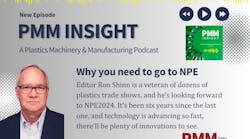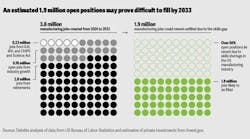By Allan Gerlat
A nonprofit dedicated to sustainability is proposing a two-pronged approach to tackling circular economy challenges, with the goals of funding increased processing capacity for recycled materials and verifying recycled resin content claims.
GreenBlue, Charlottesville, Va., is working with NSF International, an Ann Arbor, Mich.-based standards organization, to develop a Recycled Material Standard (RMS) by early next year. The RMS aims to track the recycled plastic supply chain, and also would create a marketplace for certificates—similar to carbon offsets—that manufacturers could buy, sell and tout on their products to broadcast their commitment to recycling.
The proposed RMS, a voluntary program, looks to tackle some of the challenges that so far have hamstrung recycling efforts, says Diana Bach, the sustainability consulting project manager for NSF. “Brands face challenges in sourcing the type, quality and amount of recycled resin in their direct supply chains, particularly with increasing brand commitments and goals for recycled packaging. On the other end of the supply chain, recyclers may not find demand for their product to support the premiums needed to make their business viable.”
Initially targeting plastics packaging, the RMS is designed to address both sets of concerns.
As part of its material-tracking function, the RMS would attest to the amount of recycled materials in products throughout the supply chain. Recycled resins could come from either the post-consumer or post-industrial waste streams.
This chain-of-custody system would specify material-management requirements within an organization in order to demonstrate that recycled-content claims regarding materials and products are true.
“By providing more options to source and claim recycled content, companies will be able to receive credit for their sourcing practices while maintaining the integrity and reliability of claims due to the chain-of-custody verification,” Bach says.
The second prong of the RMS and the organizations’ efforts involves Attributes of Recycled Content (ARC) certificates. Bach compares the ARCs with Renewable Energy Certificates (RECs)—the carbon offsets that companies can buy to make up for their use of fossil fuels.
“In this model, it is the rights of the beneficial attributes of a product that are traded rather than (or in addition to) the product itself,” Bach says. “A company may be receiving electricity from the standard grid mix but purchases RECs in order to claim the beneficial attributes of the renewable power—perhaps to ‘offset’ their usage of electricity from fossil fuels.”
For example, even if their end products do not contain recycled content, virgin resin users could purchase ARCs. In doing so, they could nevertheless communicate to their customers that they are taking an active role in the circular economy.
According to GreenBlue consultant Laura Thompson, funds from sale of certificates would let recyclers maintain or expand operations, thereby providing buyers and brand owners with increased output of recycled material.
As part of the ARC exchange, recyclers could receive a premium on the sale of recycled material, as long as they comply with the RMS, Bach says.
“The purchase of ARCs provides economic support for the generation of recycled resin, with the intent of expanding market incentives to increase recycling activity across the board,” Bach says.
Thompson says she knows of no other organization that’s considering a certificate-based trading system for recycled content.
The RMS will define rules for material tracking, as well as the establishment of the certificate program.
Compliance with the RMS would require independent third-party auditing by certification bodies. The goal is to establish criteria and connect with multiple audit firms so that participants have service options. The criteria have not yet been set, Bach says.
“By maintaining a verified chain-of-custody process, third-party validated claims are transferred across each element of the value chain, providing a contiguous assurance mechanism,” Thompson says. “This also creates transparency to the standard and recycled material claims, enabling consumers and other stakeholders to fully understand the meaning of on-package or on-product claims.”
The RMS will include labeling options that will be tested with consumers.
Operations participating in the system would adhere to the criteria that the two organizations establish. Participants could include material brokers, recyclers, material manufacturers, plastics processors and brand owners.
Though the groups are focusing initially on the plastic packaging industry in North America, Thompson says the effort could be expanded. “Ultimately, the RMS could be applied beyond the packaging market to other uses of recycled material, such as the use of recycled plastic in plastic toys or composite lumber, and we eventually hope to expand to a global scope.”
For more information:
NSF International, 734-769-8010, www.nsf.org
GreenBlue, 434-817-1424, https://greenblue.org






